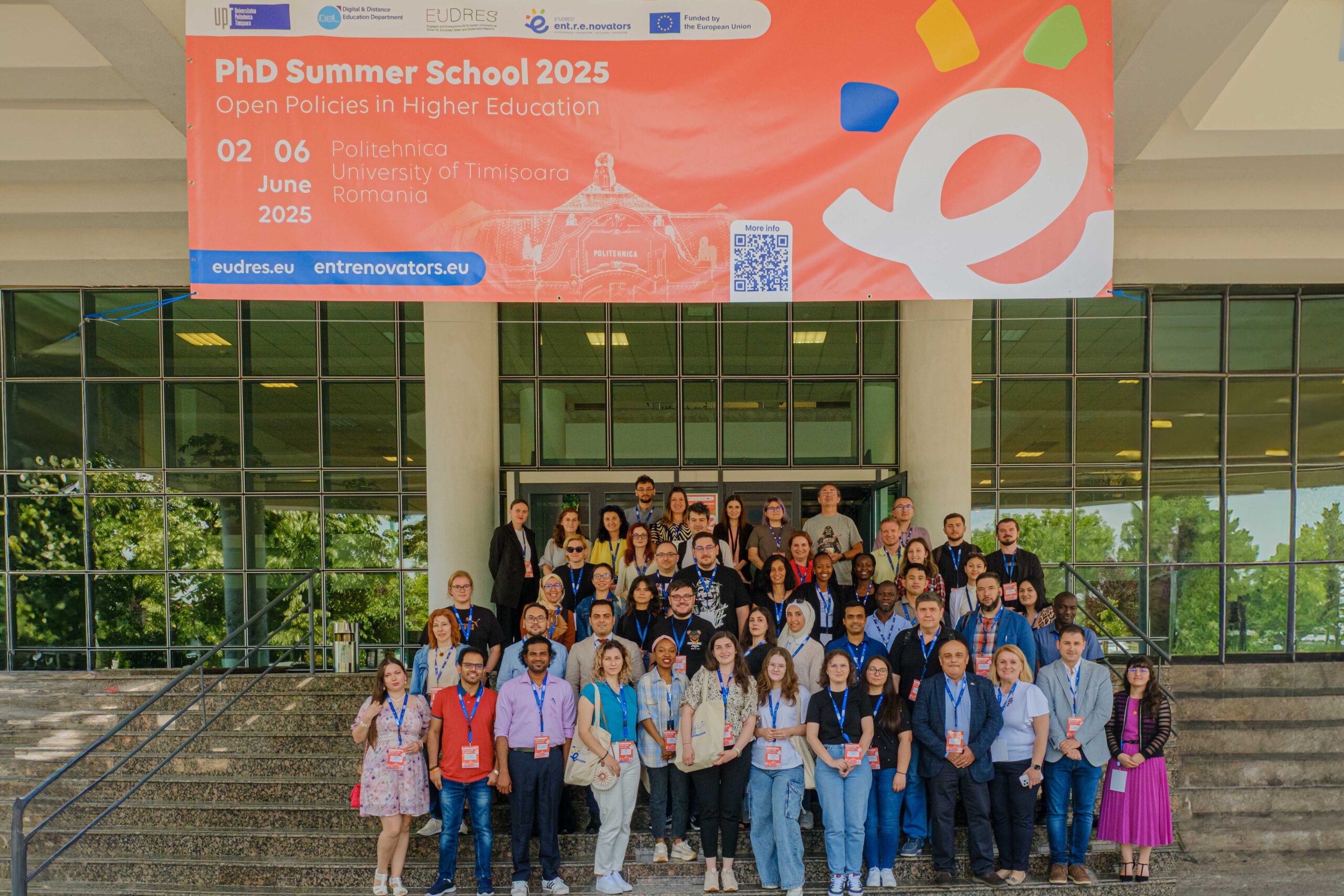
E³UDRES² – Ent-re-novators PhD Summer School 2025 – Open Practices in Higher Education, hundreds of international students, dozens of international experts connecting for 5 days in Timișoara
Timisoara, Romania – June 6, 2025 – Politehnica University Timișoara successfully hosted the first edition of the E³UDRES² – Ent-r-e-novators PhD Summer School 2025 – Open Practices in Higher Education. The event gathered over 70 international students from 22 countries in person, and an additional 400 students attended online via Zoom. 14 international experts from Romania, Portugal, Italy, Belgium, Latvia, Hungary, the Netherlands, and Austria delivered a series of valuable presentations and workshops on topics related to open education, open science, open access, and open innovation.
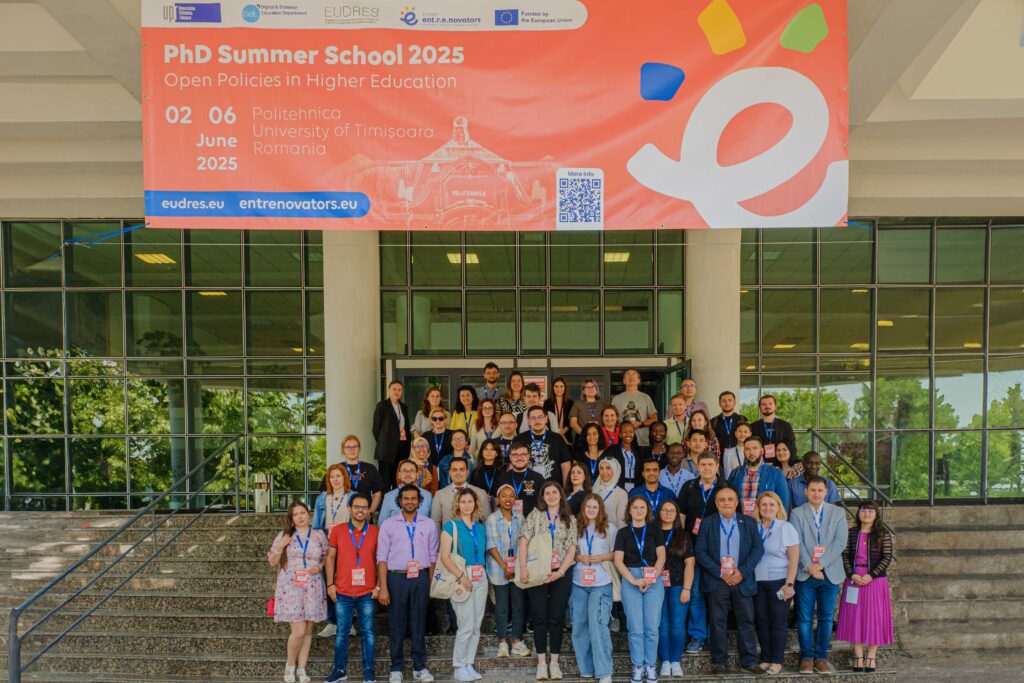
The event brought together a vibrant academic community in Timișoara, both physically and online: over 70 PhD students and young researchers from 22 countries (Romania, Portugal, Italy, Belgium, Latvia, Hungary, the Netherlands, Austria, Kenya, Germany, Pakistan, Philippines, Ukraine, Greece, Sri Lanka, Bangladesh, Iran, India, Indonesia, Syria, Ecuador, and Morocco). These students represented 12 universities (Hungarian University of Agriculture and Life Sciences, Budapest University of Technology and Economics, Politehnica University of Timisoara, Vidzeme University of Applied Sciences (ViA), Leiden University, Hellenic Mediterranean University, "Lucian Blaga" University Sibiu, Polytechnic University of Setúbal, St. Pölten University of Applied Sciences, Sumy State University, Cherkasy State Business College, and West University of Timisoara).
The participants interacted with 14 internationally recognized speakers in their fields, from Romania, Portugal, Italy, Belgium, Latvia, Hungary, the Netherlands, and Austria, leading a series of intensive sessions for students, ranging from cutting-edge information presentations to exceptionally valuable practical workshops.
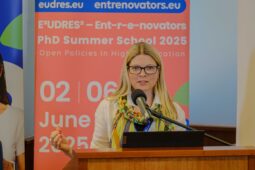
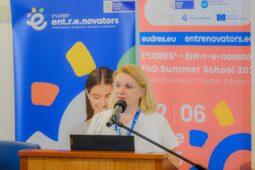
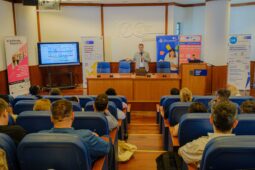
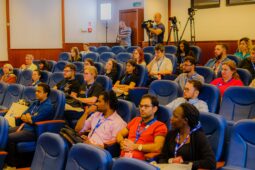
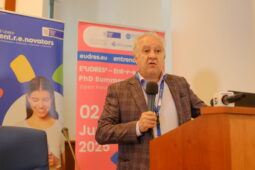
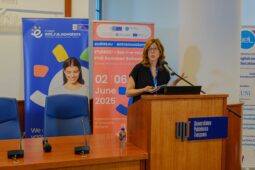
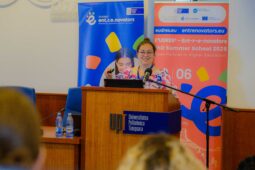
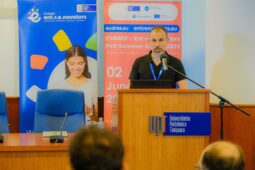
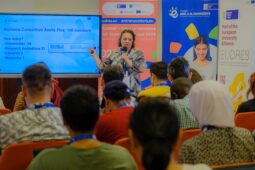
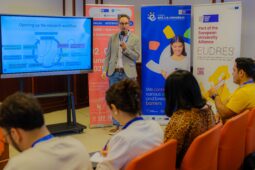
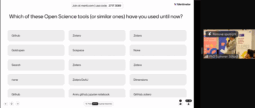
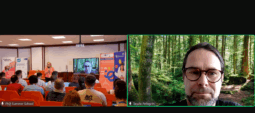

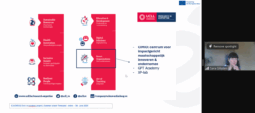
All presentations were conducted in English. After the summer school, students were awarded official participation certificates, recognized for 2 ECTS credits, confirming the successful completion of the required criteria for this post-university training, validated by Politehnica University of Timisoara, Romania, for activities held both in Timișoara and online. In addition, participants also received two open digital certificates: one for completing the MOOCs (Massive Open Online Courses) focused on Licensing and Open Licensing, and a second open digital certificate confirming the completion of learning modules on the new Arena Hub E³UDRES² platform (https://arena.eudres.eu/).
Day 1: Artificial Intelligence and Open Education
Opening the event, Dr. Diana Andone, Director of the Digital and Distance Education Department, and Prof. Dr. Eng. Liviu Marșavina, Pro-rector of UPT, officially welcomed the participants. They were followed by Prof. Em.Dr. Eng. Radu Vasiu, responsible for the E³UDRES² – Ent-re-innovators project, emphasized the importance of the E³UDRES² university alliance and the objectives of the Ent-re-innovators project.
The first presentation of the day, "The Use of AI in Open Education, OER production and Open Science", was delivered by Dr. Eng. Diana Andone. She profoundly explored the fundamental principles of open education and detailed the transformative potential of artificial intelligence within the educational context, from content generation to complex ethical considerations.
Continuing the program, Assoc. Prof. Dr. Eng. Vlad Mihăescu presented an in-depth session on "MOOCs". The presentation offered a clear definition of Massive Open Online Courses, exemplified a variety of relevant platforms, and explored their characteristics. It also analyzed the application of MOOCs in education, highlighting both the benefits and inherent challenges of their integration.
Both presentation sessions generated active dialogue and numerous questions from students, who also benefited from enhanced interaction with the speakers via the Mentimeter platform, used for real-time voting and responses.
The afternoon was dedicated to a practical workshop titled “Open Education & AI", led by Dr. Eng. Diana Andone, Dr. Eng. Vlad Mihăescu, and Dr. Silvia Couvaneiro (Polytechnic Institute of Setúbal, Portugal). Participants were guided in using advanced AI tools for educational purposes, including automatic translation, content generation, video creation, and the use of Notebook LM for developing personalized educational resources. The workshop allowed students to explore practical applications of artificial intelligence in learning processes and the creation of educational materials.
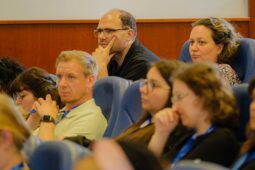
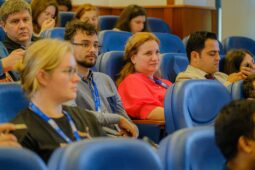
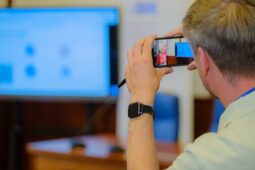
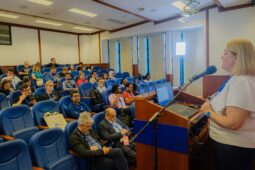
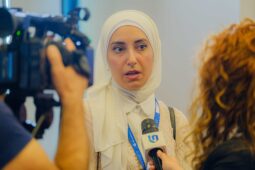
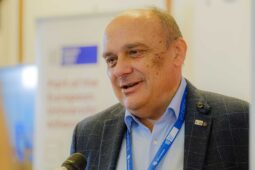
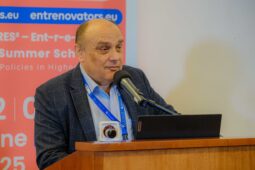
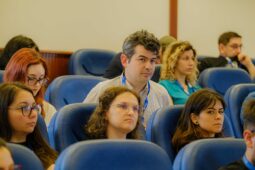
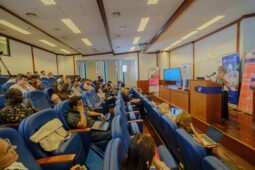
Day 2: Foundations of Open Science
The second day of the summer school was dedicated to deepening the concepts of Open Science.
Prof. Sarah de Rijcke (Leiden University, PLOS, UNESCO, Netherlands) delivered the presentation "Implementing Open Science Principles in Early-Career Research: From Policy to Practice", emphasizing the urgent need for a reassessment of researcher evaluation methods. The presentation also addressed perceived barriers to practicing Open Science and covered essential aspects such as transparency, collaboration, reproducibility, equity, policy drivers, and UNESCO's recommendations on Open Science. Prof. de Rijcke also discussed open access publishing routes (Gold, Green, Diamond), FAIR Data principles, preregistration, and collaborative tools.
Continuing on an equally essential note, Dr. Agnese Davidson (Vidzeme University of Applied Sciences, Latvia) presented "Ethical Dilemmas in Open Science". The presentation initiated discussions through a Mentimeter poll on the estimated proportion of students' work that will be published in open access. Dr. Davidson emphasized the crucial importance of ethics in research, highlighting historical examples of ethical issues and contemporary ethical challenges, including dilemmas regarding confidentiality vs. openness, misuse of open data, and equitable access. Ethical concerns related to artificial intelligence in the context of open science, such as bias in AI-assisted research and data privacy were also addressed.
The afternoon was dedicated to intensive practical workshop, “Open Access & Open Science Ethics", collaboratively led by Prof. Sarah de Rijcke and Dr. Agnese Davidson. The workshop involved a self-assessment of participants' readiness for Open Science, covering aspects such as open access, data sharing, and collaboration. Subsequently, students participated in group discussions about the barriers and facilitating factors specific to their disciplines. The session culminated in the development of individual Open Science action plans with SMART objectives and a role-playing exercise to practice negotiating open science practices with supervisors or colleagues.
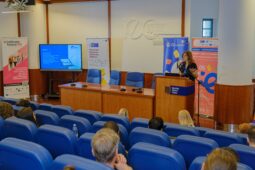
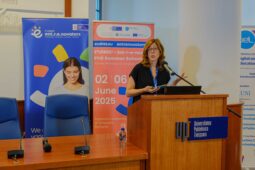
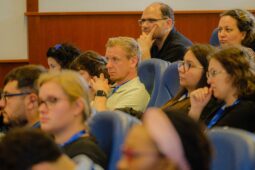
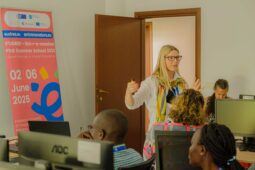
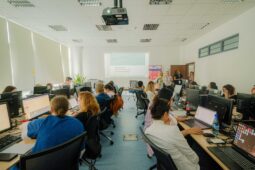
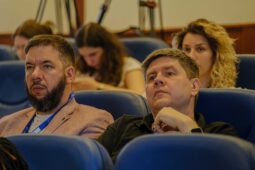
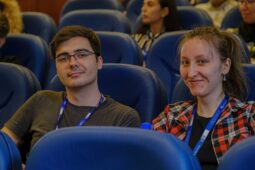
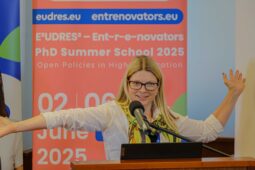
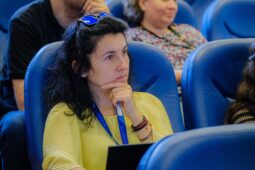
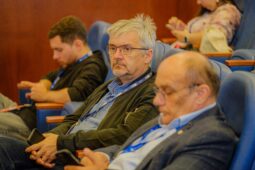
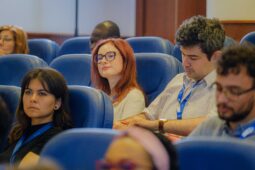
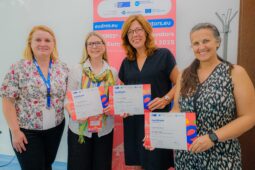
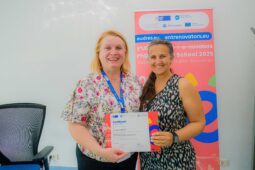
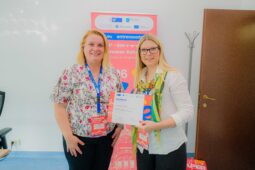
Day 3: Advanced Practices and Tools in Open Science
The third day of the PhD Summer School brought to the forefront essential aspects related to Open Science practices and research data management.
The presentation sessions were opened by Simone Sacchi, Research Data Librarian at the European University Institute (Italy), with his paper "Open Science practices in support of Open Access publishing". The presentation provided an overview of fundamental Open Science practices that support open access to research results. He addressed both formal publishing methods in open-access journals and complementary practices that contribute to a more open, transparent, and reproducible research ecosystem. Particular attention was paid to the influence of these perspectives on innovative research evaluation approaches at European and international levels, in the context of the Coalition for Advancing Research Assessment (CoARA). His presentation generated numerous questions from students, both those present in the hall and those connected online, demonstrating keen interest in the subject.
This was followed by the presentationOpen Data Analysis and Visualization for Transparency and Change", delivered by Silvia Fierascu from West University of Timisoara (Romania). The session explored how network analysis and visualization techniques can illuminate complex relationships in various ecosystems, from anti-corruption initiatives to cultural institutions. She emphasized best practices for collecting, standardizing, and using data to ensure FAIR (Findable, Accessible, Interoperable, Reusable) datasets, illustrating how to model and communicate impactful network diagrams. The presentation also engaged the audience through Mentimeter polls on their perceptions of data and the benefits of open science, generating multiple questions from students regarding data collection methodologies, storage, and levels of data analysis.
The afternoon was dedicated to practical workshops, offering students the opportunity to apply the knowledge gained. The workshopEmpowering Researchers: Skills and Roles in Open Science"was led by Alina Irimia, Open Science Projects Coordinator, and Alexandra Roman, Open Science Knowledge Hub Expert, both from UEFISCDI (Romania). This session explored the evolving landscape of skills required for Open Science, discussing new training needs, emerging career options (such as data stewardship and academic communication), and the transformative impact of Open Science on research and education. The discussions also contributed to a national exercise identifying skill and curriculum gaps, supporting the development of recommendations for a national competence framework for Open Science in Romania.
Another practical workshop, “Openness, reproducibility and trust: practical advice", was delivered by Simone Sacchi. This hands-on session guided students in choosing open access journals and implementing strategies to make their research workflows more open and transparent. Participants explored key steps and tools to enhance the credibility and visibility of their academic work.
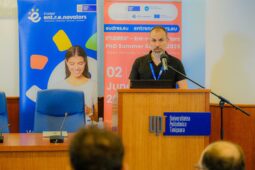
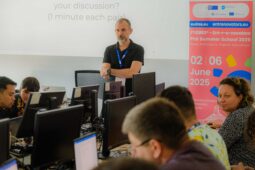
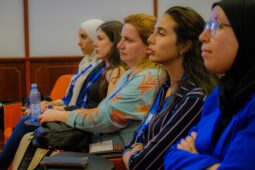
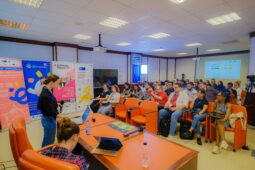
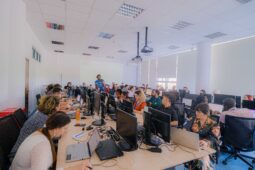
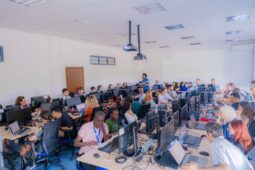
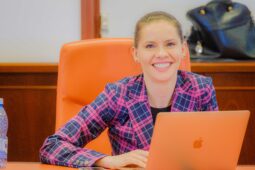

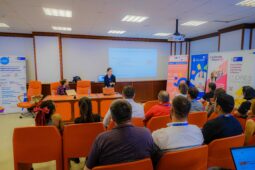
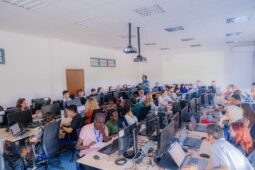
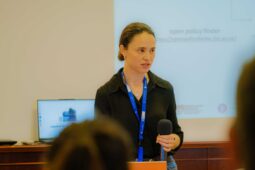
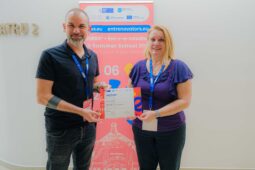
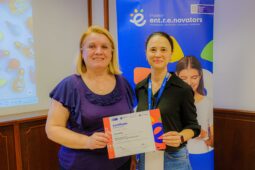
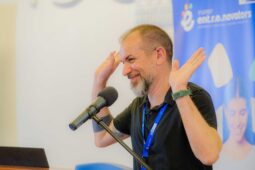
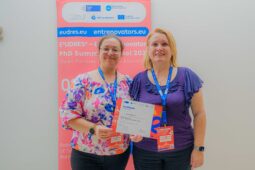
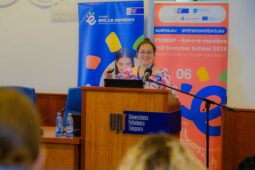
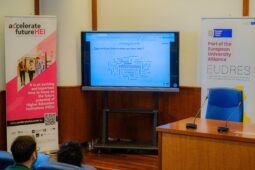
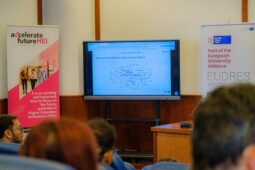
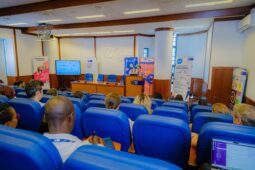
Day 4: Open Publishing, Open Data, and Digital Tools for Research
The fourth day of the PhD Summer School was dedicated to the practical aspects of open publishing and the use of digital tools in research, featuring presentations and an interactive workshop.
The sessions began with Dr. Tassilo Pellegrini (St. Pölten University of Applied Sciences), who delivered the online presentation "Open Data 1-0-1” via Zoom, exploring key concepts of open data and licensing.
Prof. Em. Dr. Eng. Radu Vasiu from Politehnica University of Timișoara followed with a discussion on “Open Publishing", delving into digital competences and the principles of open access publishing, highlighting self-assessment and competence development tools, as well as their crucial role in increasing research productivity.
Next, Assoc. Prof. Dr. Eng. Silviu Vert from Politehnica University of Timisoara (Romania) presented “Open Science & Open Innovation Tools", introducing students to the Open Science taxonomy. Furthermore, he detailed tools that support transparency, collaboration, and impact throughout the entire research lifecycle, from discovery to publication and evaluation.
Concluding the series of presentations, Dr. Simona Bursașiu, Librarian at the UPT Central Library (Romania), presented "How to publish with Open Access", highlighting the various services offered by the UPT Library, including access to a vast consortium of databases and support for open access publishing, especially through transformative agreements.
The afternoon was dedicated to intensive practical workshop titled “Open Research and Digital ToolsThis session was guided by Dr. Simona Bursașiu and Lecturer Dr. Silviu Vert, with an intervention from Dr. Diana Andone. Students gained practical experience in creating personal libraries with Zotero, managing researcher profiles, and using AI tools to enhance their research workflow. They also explored the assignment of DOIs, the use of the UPT Institutional Digital Repository (DSpace), the generation of Creative Commons licenses, and uploading research data to platforms like FigShare.
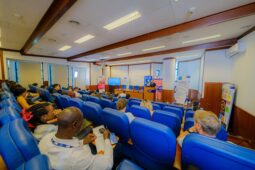
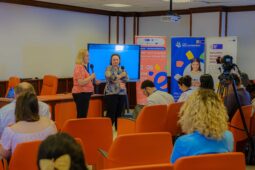
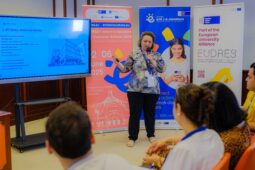





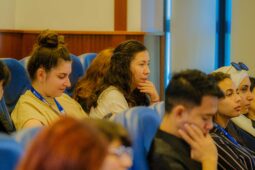
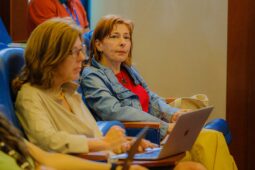
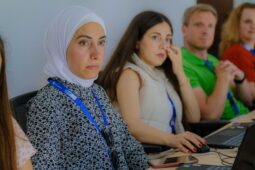
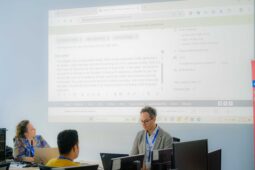
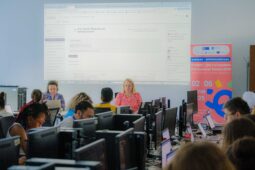
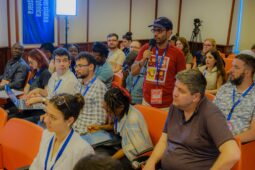
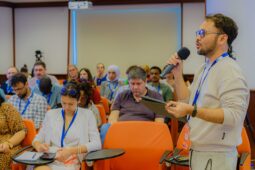
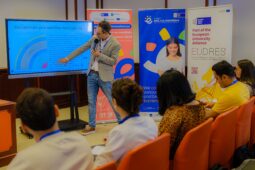
Day 5: Open Innovation and Open Data
The final day of the PhD Summer School kicked off with a captivating presentation on the intersection of open innovation and the circular economy. Sara Gilissen from UC Leuven-Limburg University of Applied Sciences, Belgium, delivered the presentation "Open Innovation in SMEs: Transitioning from a Linear to a Circular Economy.” She explored how open innovation and co-creation can significantly benefit small and medium-sized enterprises (SMEs). Gilissen highlighted that open innovation is crucial in a globalized, sustainability-focused economy, encouraging collaboration across societal layers and industries quadruple helix model (government, academia, industry, civil society) for business model innovation in SMEs, offering project examples and lessons learned from Limburg. The session concluded with participants reflecting on their key takeaways and their desired roles in open innovation.
Following this, Klaudia Polgar (Hungarian University of Agriculture and Life Sciences, Hungary) presented on "Open Data & FAIR". She emphasized how open science increases transparency and public trust by making research data openly accessible. Polgár elaborated on the FAIR principles (Findable, Accessible, Interoperable, and Reusable), highlighting their importance for effective data management, especially with the rise of AI and large-scale analyses. She clarified key concepts like metadata, file formats, and vocabularies, underscoring that while data can be FAIR or open, or both, FAIR data significantly enhances usability and value, and critically, "FAIR does not mean open."
After the final presentations, students benefited from a one-on-one mentorship session in the hall, provided by Dr. Diana Andone, Assoc.Prof. Dr. Silviu Vert, and Assoc. Prof. Dr. Eng. Vlad Mihăescu. This session was followed by the official closing ceremony of the PhD Summer School, during which participants received their certificates of participation.
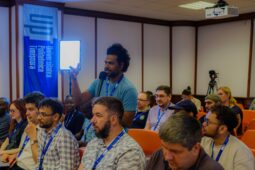

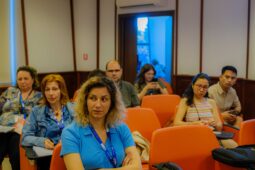
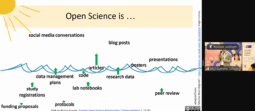
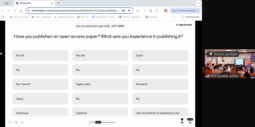
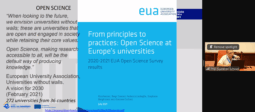
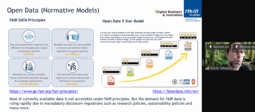
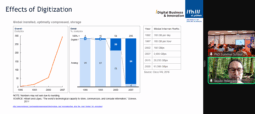
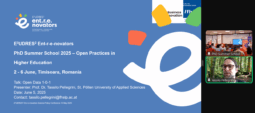
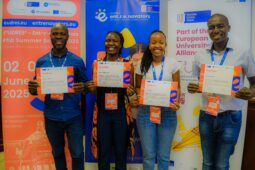
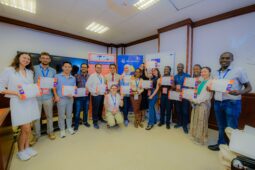
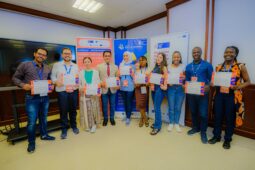
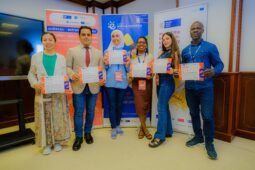
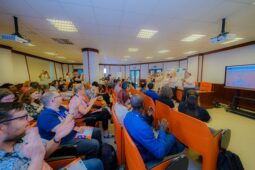
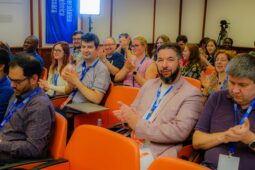
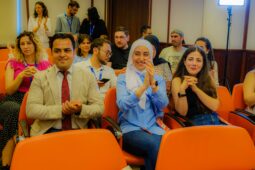
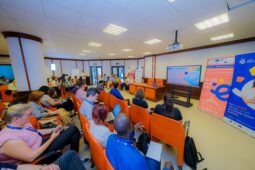
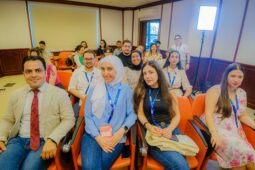
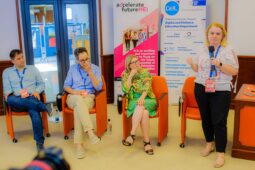
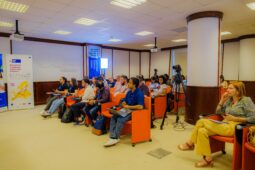
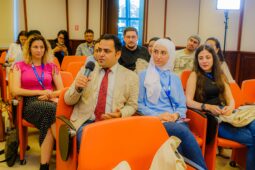
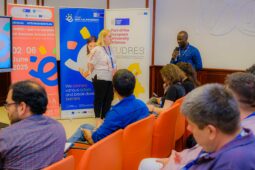
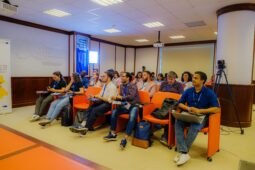
Social Program and Networking
In addition to the rigorous academic sessions, the event also facilitated social moments designed to strengthen connections among participants. On Monday evening, the students, speakers, and the DeL and E³UDRES² team attended a festive Opening Dinner at Casa Politehnicii 2. This occasion provided a relaxed setting for networking and sharing initial impressions of the summer school, creating an atmosphere conducive to collaboration.
On Tuesday afternoon, participants had the opportunity to explore the beauty of Timișoara through a guided city tour with a licensed guide. This cultural experience allowed them to discover the city's rich history and impressive architecture, thus complementing the academic program with valuable local insights.
On Wednesday afternoon, the PhD Summer School students embarked on a captivating guided tour at the National Museum of Banat. Led by a museum expert, they explored two remarkable exhibitions:The Belle Époque Woman", which highlighted the silent courage and resilience of women during World War I, and "Igriș – The Monastery of Kings", showcasing archaeological finds and architectural fragments from the Cistercian Abbey of Igriș.
On Thursday, participants enjoyed a relaxing and picturesque Vaporetto cruise on the Bega River, offering a unique perspective of the city and strengthening camaraderie among the group.
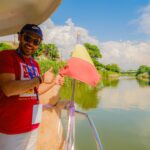
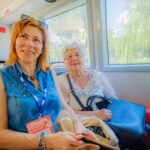
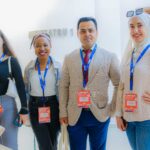
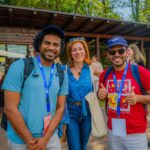
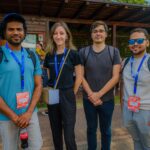
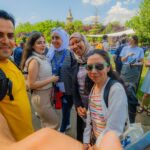
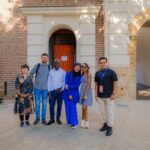
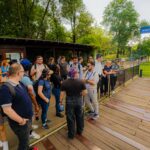
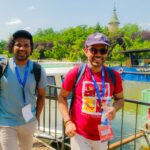
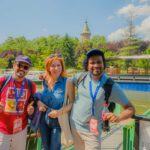
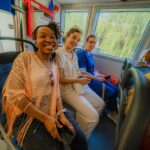
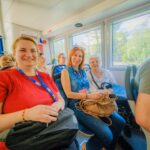
We invite you to watch the after movie of these 5 days full of activities, courses, outings, socializing, and more. Check it out now!